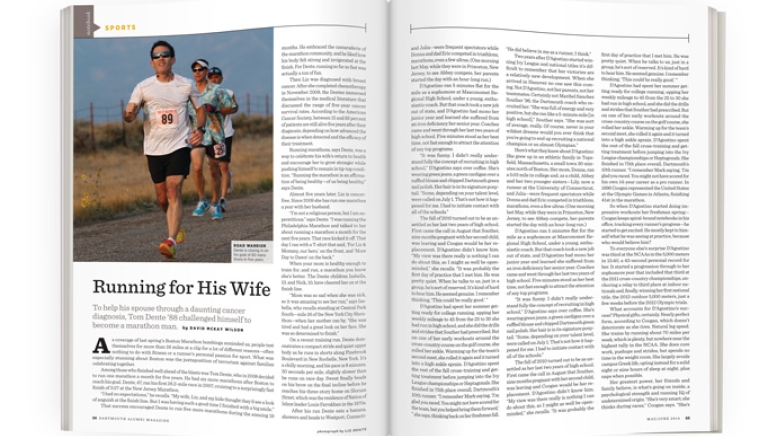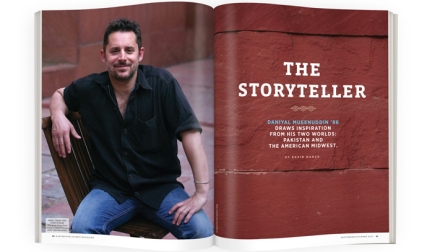As coverage of last spring’s Boston Marathon bombings reminded us, people test themselves for more than 26 miles at a clip for a lot of different reasons—often nothing to do with fitness or a runner’s personal passion for sport. What was especially stunning about Boston was the juxtaposition of terrorism against families celebrating together.
Among those who finished well ahead of the blasts was Tom Dente, who in 2008 decided to run one marathon a month for five years. He had six more marathons after Boston to reach his goal. Dente, 47, ran his first 26.2-mile race in 2007, cruising to a surprisingly fast finish of 3:27 at the New Jersey Marathon.
“I had no expectations,” he recalls. “My wife, Liz, and my kids thought they’d see a look of anguish at the finish line. But I was having such a good time I finished with a big smile.”
That success encouraged Dente to run five more marathons during the ensuing 19 months. He embraced the camaraderie of the marathon community, and he liked how his body felt strong and invigorated at the finish. For Dente, running so far so fast was actually a ton of fun.
Then Liz was diagnosed with breast cancer. After she completed chemotherapy in November 2008, the Dentes immersed themselves in the medical literature that discussed the range of five-year cancer survival rates. According to the American Cancer Society, between 15 and 93 percent of patients are still alive five years after their diagnosis, depending on how advanced the disease is when detected and the efficacy of their treatment.
Running marathons, says Dente, was a way to celebrate his wife’s return to health and encourage her to grow stronger while pushing himself to remain in tip-top condition. “Running the marathon is an affirmation of being healthy—of us being healthy,” says Dente.
Almost five years later, Liz is cancer-free. Since 2009 she has run one marathon a year with her husband.
“I’m not a religious person, but I am superstitious,” says Dente. “I was running the Philadelphia Marathon and talked to her about running a marathon a month for the next five years. That race kicked it off. That day I ran with a T-shirt that said, ‘For Liz & Mommy, our hero,’ on the front, and ‘More Day to Dawn’ on the back.”
When your mom is healthy enough to train for, and run, a marathon you know she’s better. The Dente children Isabella, 13, and Nick, 10, have cheered her on at the finish line.
“Mom was so sad when she was sick, so it was amazing to see her run,” says Isabella, who recalls standing at Central Park South—mile 26 of the New York City Marathon—when her mother ran by. “She was tired and had a great look on her face. She was so determined to finish.”
On a recent training run, Dente demonstrates a compact stride and quiet upper body as he runs in shorts along Pinebrook Boulevard in New Rochelle, New York. It’s a chilly morning, and his pace is 8 minutes, 30 seconds per mile, slightly slower than he runs on race day. Sweat finally beads on his brow on the final incline before he reaches his three-story home on Slocum Street, which was the residence of Nation of Islam leader Louis Farrakhan in the 1970s.
After his run Dente eats a banana, showers and heads to Westport, Connecticut, where he works as chief operating officer at InsideNGO, a nonprofit membership organization that provides technical assistance to the world’s top aid agencies, such as Save the Children, Habitat for Humanity and Oxfam.
Joe Jackson ’88 marvels at his college chum’s transformation from a guy who plodded pigeon-toed across the quad into a veritable marathon-running machine. “Tom had this comic kind of walk—you’d swear his legs didn’t bend at the knees,” says Jackson, a child psychiatrist in Somerville, Massachusetts, and one of Dente’s brothers at Sigma Alpha Epsilon. “It’s an amazing turn of events. I know the power of Tom’s intellectual intensity. My conclusion is that marathon running must be so much about mind over matter.”
Training helps too. Dente runs between races to maintain his muscle tone and strength. In 2012 he logged about 1,200 miles—315 in 12 marathons and 900 more on his training runs. At 5 feet, 10 inches and 165 pounds, he’s a few pounds lighter than he was as a Dartmouth freshman. He could still fit into the 32-inch waistline pants he wore then.
Running marathons has become a way of life for Dente, who has integrated it with his professional work schedule. In February 2012, after leading an InsideNGO workshop in Kenya, he ran the Kilimanjaro Marathon in the foothills of Africa’s highest peak. A boy in flip-flops ran alongside for the final 10 miles. At the finish Dente gave the lad his 2009 Boston Marathon T-shirt from his running bag. “I hope someday you’ll read about a famous Tanzanian runner who remembers running with a crazy middle-aged American,” he says.
Dente says each marathon has its own character. New York is a public celebration, with more than 45,000 runners wending their way through its five boroughs, cheered on by millions. At the E.T. Full Moon Midnight Marathon in Rachel, Nevada, Dente, wearing a headlamp, set out with 159 other runners into the darkness near Area 51. He ran 3:43 through the desert under a full moon, with shooting stars tumbling through the dark sky—and no alien encounters.
The 2010 Istanbul Marathon sent him on a route that began in Asia and ended in Europe. Upon completion of the Reggae Marathon in Jamaica in December, he slugged down coconut milk and a Red Stripe offered by race officials.
“I’ll never play baseball with Derek Jeter or golf with Tiger Woods, but there’s something special about running in the same race, on the same day, with Olympic athletes,” says Dente, who majored in economics and earned an M.B.A. at Columbia. “Marathons are nice democratic races. They are fun too.”
His fastest time–3:15–came in December 2010 at the Rehoboth Beach Marathon on a clear autumn day with the temperature in the 40s and a tailwind that kicked up along the Delaware coast. His second slowest time, 4:00, came at the 2011 Gansett Marathon in Rhode Island, which he ran while fighting bronchitis.
“I was so sick, but I didn’t want to give up the race,” he recalls. “I’m always fearful that I might get injured and not be able to do it again. It’s easier to keep on rather than starting and stopping.”
Dente discovered competitive running in his late 30s. In high school he ran freshman track but switched to football, where he says he developed into “a very bad reserve lineman.” In college he ran for fun with Jackson and Mike Grisham ’88 on loops around Occom Pond as well as across the Connecticut River and back up the hill to campus.
His love for running blossomed while traveling as a management consultant for Price Waterhouse, A.T. Kearney and Bain Consulting. He’d pack his running shoes to get exercise after spending the day at a conference table. “When you are on the road, running is one of the easiest ways to keep fit,” he says. “It’s a fun way to see places too.”
Fittingly, the last stop on Dente’s odyssey will be Athens, Greece, on November 10. Liz will be running with him.
David McKay Wilson, a columnist at The Journal News in White Plains, New York, has contributed to DAM since 2004.




